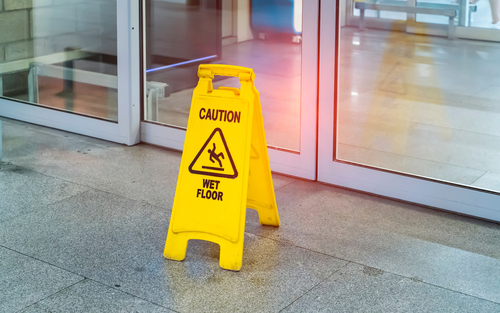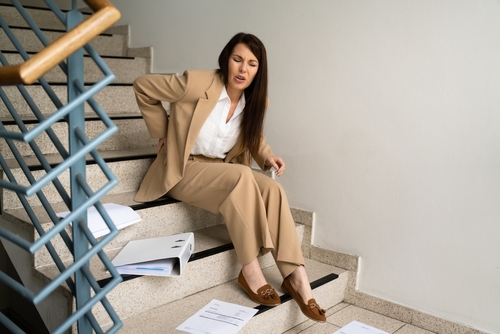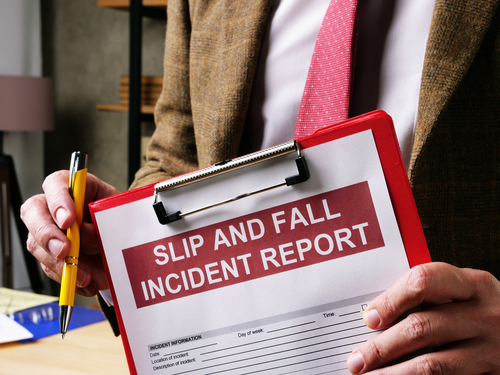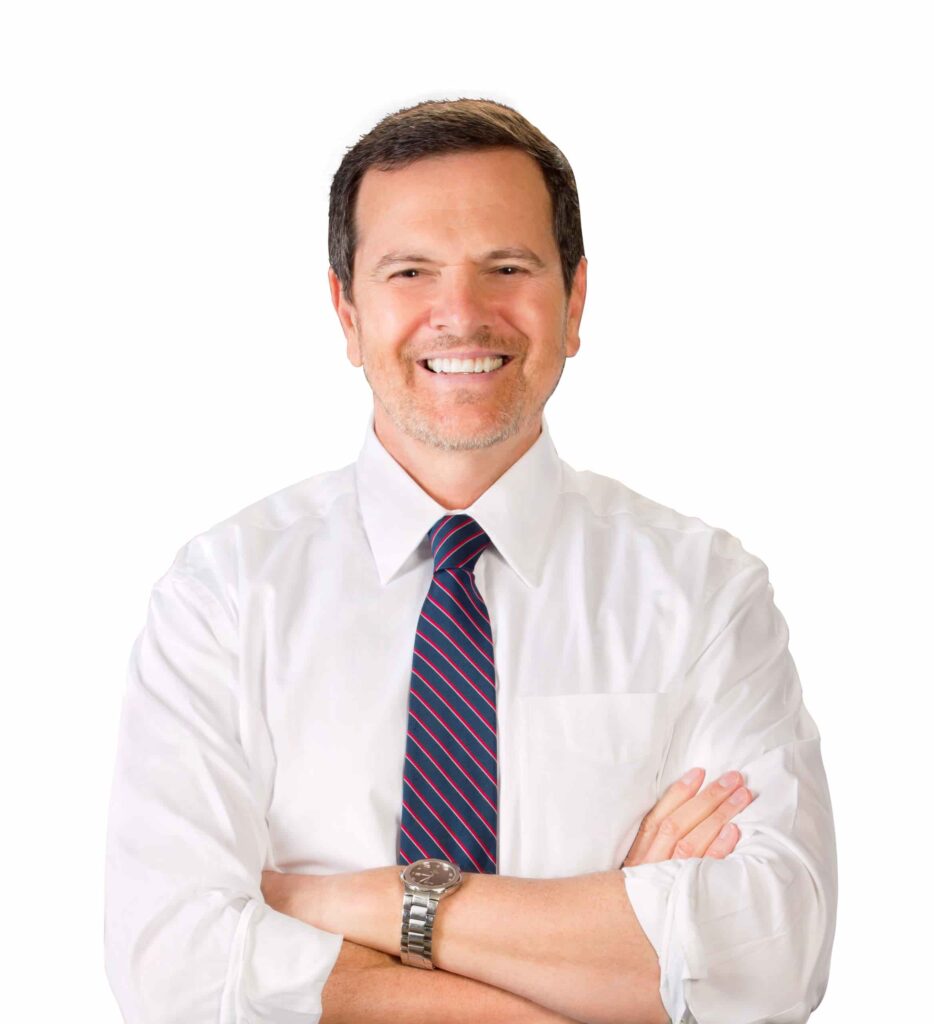Steven A. Bagen | September 12, 2025 | Personal Injury

A sudden fall in a restaurant can disrupt your life in an instant, but Florida law provides a framework for holding negligent property owners accountable. Understanding your rights is the first step toward securing your recovery after a restaurant slip and fall accident in Gainesville.
A personal injury lawyer can help you pursue a claim for compensation and hold a negligent business accountable for the harm it caused. A Gainesville slip and fall accident lawyer can guide you through the process, gather evidence, and fight for the compensation you deserve.
Key Takeaways for Restaurant Slip and Fall Accidents in Gainesville
- Property owners in Florida have a legal duty of care to keep their premises reasonably safe for customers.
- To build a successful claim, you must show the restaurant knew or should have known about the dangerous condition that caused your fall.
- Evidence like photos and witness contact information helps prove negligence in a slip and fall case.
- Florida’s comparative negligence rule means you may still be able to recover damages even if you were partially at fault for the accident.
Common Hazards in Gainesville Eateries

A pleasant meal out at a restaurant on University Avenue or in Celebration Pointe can quickly turn disastrous due to unsafe conditions. Restaurant environments are busy, fast-paced settings where hazards can develop quickly. You need a lawyer after a slip and fall to protect your rights, gather evidence, and pursue fair compensation for your injuries.
Restaurant owners must remain vigilant to prevent slip and fall accidents in Gainesville. When they fail, innocent patrons suffer the consequences.
Common restaurant hazards include:
- Wet and Slippery Surfaces: Spilled drinks, water from leaks, tracked-in grease from the kitchen, and recently mopped floors without warning signs create dangerously slick surfaces.
- Cluttered Walkways and Poor Lighting: Staff may leave boxes or service carts in walkways, while wrinkled floor mats and dim lighting can hide tripping hazards or changes in floor elevation.
- Structural Defects and Damaged Flooring: Loose tiles, torn carpeting, uneven floorboards inside, or cracked pavement and broken stairs outside are all structural failures that can cause a patron to fall.
A Restaurant’s Legal Responsibility to Patrons
Every restaurant in Florida, from small cafes in the Duckpond neighborhood to large chains near Butler Plaza, owes a duty of care to its patrons to maintain a reasonably safe property.
This duty involves more than just reacting to known dangers; it demands proactive efforts to find and fix potential hazards. Failure to meet this standard forms the basis of restaurant negligence claims in Florida.
Premises Liability
Premises liability law governs injuries that happen on someone else’s property. For a restaurant patron, the law defines you as a business invitee, the legal status that receives the highest level of protection.
The owner must repair dangers they know about and make regular and reasonable inspections to discover hidden hazards. Simply stating they were unaware of the spilled drink or broken tile isn’t an adequate defense if a reasonable inspection would have revealed the problem.
Establishing Reasonable Care
Courts consider several factors to determine if a restaurant acted reasonably. Did the restaurant have a regular inspection schedule for floors and walkways? Did employees follow procedures for cleaning up spills promptly and placing warning signs? Did the hazard exist for a long enough period that staff should have found it? Contact a lawyer to review these factors, assess the restaurant’s actions, and determine if negligence played a role in your injury.
For instance, a puddle from a freshly spilled drink gives staff little time to react. A puddle from a leaky ice machine that has been dripping for hours is a different story, showing a clear lack of attention and grounds for a slip and fall claim.
Proving the Restaurant Had Notice
A key part of a successful claim is showing the restaurant had notice of the dangerous condition. This can happen in one of two ways.
Actual notice means the owner or an employee knew about the hazard because they saw it or created it themselves. Constructive notice applies when a condition existed for such a duration that a reasonably diligent owner would have discovered it.
Evidence that helps establish constructive notice often includes witness statements about how long a spill was on the floor or video surveillance showing that the area was unmonitored for an extended period. Proving this aspect of your claim strengthens your case for compensation.
The Connection Between Alcohol Service and Falls
Restaurants that serve alcohol face an even greater challenge to keep patrons safe. Alcohol consumption can impair judgment, balance, and coordination, making patrons more susceptible to even minor hazards.
A small wrinkle in a rug or a poorly lit step that a sober person might navigate easily becomes a significant danger for someone who has been drinking.
Common signs of a restaurant failing to manage risks associated with alcohol include:
- Poor Lighting: Dark hallways or staircases leading to restrooms become more dangerous for patrons with impaired coordination.
- Obstructed Pathways: Furniture, server stations, or decor placed in walkways can be difficult for someone to see and avoid after a few drinks.
- Lack of Handrails: Staircases without sturdy and accessible handrails pose a serious risk to any patron, especially those who may be less steady on their feet.
- Slow Spill Response: Wet floors are a hazard for everyone, but the danger escalates in an environment where patrons’ reaction times are slower due to alcohol.
What Determines a Restaurant’s Liability?
Ultimately, a restaurant’s liability hinges on proving negligence. Your attorney must demonstrate that the restaurant breached its duty of care and that this breach directly caused your injuries.
It’s not enough to show that you fell and got hurt on their property. You must connect your injury to a specific failure or oversight by the restaurant’s owner or employees.
The Power of Evidence
The more documentation you have, the better your attorney can illustrate the restaurant’s negligence. You must act quickly, as critical evidence can disappear. The business may clean up the hazard, witnesses’ memories can fade, and surveillance video footage is often erased on a loop. You need a lawyer after a restaurant slip and fall to preserve evidence, handle communications, and build a strong case for compensation.
A swift response to preserve this information is vital for people hurt in restaurant slip and fall accidents in Gainesville.
Important pieces of evidence may include:
- Photographs and Videos: Pictures or videos taken immediately after the incident of the hazardous condition that caused you to fall can be persuasive.
- Incident Reports: If you reported your fall to management, they may have created an official report, which can provide essential details.
- Witness Information: The names and phone numbers of other patrons or employees who saw the fall or the unsafe condition are valuable.
- Physical Evidence: Keep the shoes and clothing you wore during the fall, as they might be relevant to the case.
- Medical Records: Your medical documentation directly links the fall to your injuries and outlines the extent of the harm.
6 Steps To Take From Home After Your Injury

If you have already addressed your immediate medical needs, there are actions you can take from home to protect your rights. The period following your injury is a crucial time for gathering information and documenting what happened. If you’re thinking, “I need a lawyer,” now is the time to reach out for legal help before vital evidence disappears or deadlines pass.
Taking these organized steps can make a significant difference in the outcome of your claim:
- Document Everything You Remember: Write down a detailed account of the incident while it’s still fresh in your mind. Include the date, time, location within the restaurant, what you were doing, how you fell, and what you saw, heard, and felt immediately afterward. Note who you spoke with and what they said.
- Preserve the Physical Evidence: Don’t wear or wash the clothes and shoes you had on during the fall. Store them safely in a bag. These items may become necessary evidence later to show the circumstances of the fall.
- Keep a Pain and Symptom Journal: Make notes about your physical and emotional condition daily. Detail your pain levels, any physical limitations, difficulties with daily tasks, and feelings of anxiety or stress. This journal creates a continuous record of how the injuries impact your life.
- Track All Your Expenses: Start a folder to keep all bills, receipts, and documents related to the accident. This includes medical bills, pharmacy receipts for prescriptions and assistive devices, and mileage logs for trips to the doctor. Document any lost wages from being unable to work.
- Avoid Speaking With the Restaurant’s Insurer: An insurance adjuster from the restaurant’s carrier may contact you soon after the accident. These adjusters often look for information they can use to minimize or deny your claim. You don’t have to give them a recorded statement.
- Contact a Gainesville Premises Liability Lawyer: A legal professional can immediately take action to preserve evidence and handle all communications for you. An attorney will work to protect your interests while you focus on your recovery.
How a Lawyer Helps With Restaurant Slip and Fall Accidents in Gainesville
Trying to handle a claim on your own while recovering from an injury is a difficult task. An experienced attorney can lift that burden and manage every aspect of your case. They use their knowledge and resources to build the strongest possible claim on your behalf. The cost to hire a lawyer should not deter you—most personal injury attorneys work on a contingency fee basis, meaning you pay nothing unless they win your case.
Here are some specific ways an attorney helps you seek justice:
- Investigating the Incident: A lawyer investigates the scene, interviews witnesses, and sends official letters to preserve crucial evidence like video surveillance footage.
- Calculating Your Total Damages: Your attorney may work with medical and financial professionals to calculate the full value of your claim, including future medical needs and lost earning capacity.
- Establishing Liability: Your legal team uses the collected evidence, witness testimony, and expert opinions to construct a clear argument proving the restaurant’s negligence.
- Negotiating With the Insurance Company: Your lawyer handles all communication and negotiations with the restaurant’s insurance representatives, protecting you from tactics designed to reduce your settlement.
- Representing You in Court: If the insurance company refuses a fair settlement, your attorney can file a lawsuit and fight for your interests at trial.
FAQ for Restaurant Slip and Fall Accidents in Gainesville
What Evidence Helps Prove a Restaurant Is at Fault?
To prove a restaurant’s fault, you need evidence showing it created, knew about, or should have known about the hazardous condition. This evidence often includes photos or videos of the scene, incident reports, witness statements, and video from surveillance cameras.
Your medical records can also connect the restaurant’s negligence to the injuries you sustained.
How Long Do I Have To File a Claim for a Slip and Fall in Florida?
Generally, you must file a lawsuit within two years of the date of the accident. Waiting too long to take action can result in losing your right to seek any compensation. Contact a Florida premises liability attorney immediately to protect your claim.
Can I Still Have a Case if I Was Partially at Fault?
Yes, you can still have a valid premises liability case even if you share some blame. Florida follows a modified comparative negligence system. This means that if you’re found to be partially responsible for your accident, your compensation will be reduced by your percentage of fault.
However, you cannot recover compensation if your fault exceeds 50%. An attorney can help counter unfair accusations that you were to blame.
What Kinds of Compensation Can I Pursue After a Restaurant Slip and Fall Accident in Gainesville?
You may pursue compensation for a range of losses, known as damages. These include all your medical expenses, from the initial emergency room visit to ongoing physical therapy.
You can also seek recovery for lost wages if the injury caused you to miss work, as well as compensation for your physical pain and emotional suffering.
What If There Were No Witnesses to My Fall?
Even without witnesses, you may still have a strong case, and your own testimony provides a foundation. Evidence like surveillance footage, photos of the hazard, and expert analysis of the restaurant’s maintenance logs or flooring materials can also effectively prove that a dangerous condition caused your fall.
Securing Your Future

Taking legal action isn’t just about holding a restaurant accountable for its past negligence. It’s a forward-looking step to secure the necessary resources to rebuild your health and financial stability.
Your focus belongs on your recovery, not fighting with an insurance company. Let a strong legal advocate handle the complexities of your claim and position you for a successful outcome.
At Steven A. Bagen & Associates, P.A., we understand the challenges after a restaurant slip and fall accident in Gainesville. Our firm offers a no-fee guarantee, which means you pay us nothing unless we win your case. Contact us for a free, 24/7 consultation by calling (800) 800-2575 today.
